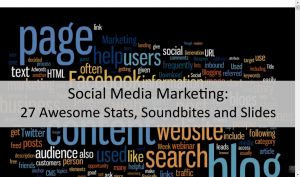 The terms web (or online) presence and website are often used interchangeably but they are very far from being the same thing. Web presence is the collective existence online of a company or individual. A website is one example.
The terms web (or online) presence and website are often used interchangeably but they are very far from being the same thing. Web presence is the collective existence online of a company or individual. A website is one example.
So began an excellent article by my blogger colleague Michael Cohn, who serves clients by building a content-rich web presence, applying Internet marketing techniques, and utilizing blog and social media technologies.
Michael’s blog CompuKol Connection is a treasure trove of social media Best Practices, and I’m honored to be one of his Guest Posters. Here is one of his recent articles that should be required reading for anyone wanting to establish a business online.
 What is an Online Presence?
What is an Online Presence?
Guest Post by Michael Cohn
Many businesses have websites with their branding and customized look and feel. There are millions of websites that range from simple and small to much more intricate and interactive. Everyone understands what a website is and what purpose it serves. So, what is an online presence and how do you go about establishing one for your business?
There is so much that can be a part of your web presence. An online presence is any existence of an individual or business that can be found via an online search. An example of an individual who is not active on the Internet but who has a online presence is one who is a member of an association that has a member directory listing online. Another example is an individual who only has a LinkedIn or Facebook profile. How do you leverage and enhance their existing web presence to boost their exposure and reputation and market themselves and/or their business online?
One way is to design and build a compelling website or a blog. Once the concept of the web presence has been established, it is time to start building it, including the all-important keywords that are essential to that market. Without keywords, the website will not be successful and will essentially stagnate. It is important to understand that it takes a lot more than a beautiful-looking website to cultivate the success of a particular business through its online presence. Another way is to capitalize on their existing web presence and enhance it with additional social media marketing interactions. A third option is a combination of the two.
Targeted keywords: Well-placed keywords are critical for both options. You might ask how you go about identifying the most effective keywords that will be recognized by the search engines and that will continually drive more and more online traffic to your web presence. Careful research is very important because finding the best keywords for your niche must be the absolute first thing that you do. That is your initial step in establishing your web presence.
Once you have built the foundation, you can begin to build your web presence. Of course, the information must be presented in a way that is visually appealing and compelling. However, there is a great deal more that goes into it. It is well beyond merely designing and creating a web presence. If the content in your online presence is presented correctly, the result could potentially be huge regarding your success at selling your products and/or services.
Web presence visitors: Once you have established your web presence, the next critical element is getting people to visit. The more traffic you are able to drive to your online presence, the better it will be for your business. Of course, this ties back to when you were choosing keywords and key phrases. If you have placed them effectively, the people will visit and visit often.
Capturing and converting leads: Your online presence has an important job to do. It needs to effectively capture leads (leads are people who have the potential of eventually becoming your clients). Once the leads have been captured, it is important to go through the conversion process in a manner that is appropriate and sensitive. An important part of the success of converting leads lies with the design of the web presence, the compelling nature of the content, the aesthetic appeal of the graphics, etc.
Interacting through social media: Having interaction with your online connections is extraordinarily important and it adds a deeper layer to the relationship that you will be establishing through your online presence. The more you interact with people, the more they will start to trust you and to find you to be credible and knowledgeable. You will start to understand how much the interaction contributes to the success of your business.
So, how do you enhance your web presence?
The following are elements that will help you to improve your web presence:
- A clear market definition
- Understandable and appropriate keywords
- Website and/or social media pages that are properly optimized for the search engines
- A website and/or social media pages that are aesthetically appealing and properly organized so that any of your visitors immediately understand what your business offers
- Complete social media profiles
- A clear focus on your target connections and target market
- A strategy on how to gain fans, followers and business connections
- A strategy on how to promote yourself and/or your business and disseminate your marketing messages
- Compelling content and effective calls-to-action
- An effective social media marketing campaign for your business
- A high volume of traffic on a consistent basis
- Effective lead capture and conversion strategy
If you review this list and find that any of the concepts are missing, in all likelihood, you just have a website and not a web presence. With some adjustments, you can make your web presence more effective.
Conclusion
Now that the distinction between a website and a web presence has been carefully explained, you will be able to analyze what you have and what you need when it comes to your online exposure and reputation. Your web presence is an entire suite of online elements that should be used together to create a successful marketing campaign. The more you share of yourself and of your business, the stronger your presence will be and the greater your success and the success of your business will be.
 The next time you have the opportunity to meet and mingle with “strangers,” why not come prepared. Plan to ask questions, not sell anything. In today’s business world where selling is being replaced with engagement, your best bet is to find new clients through genuine conversation.
The next time you have the opportunity to meet and mingle with “strangers,” why not come prepared. Plan to ask questions, not sell anything. In today’s business world where selling is being replaced with engagement, your best bet is to find new clients through genuine conversation. 







 n
n fl
fl –
– ns)
ns) 






